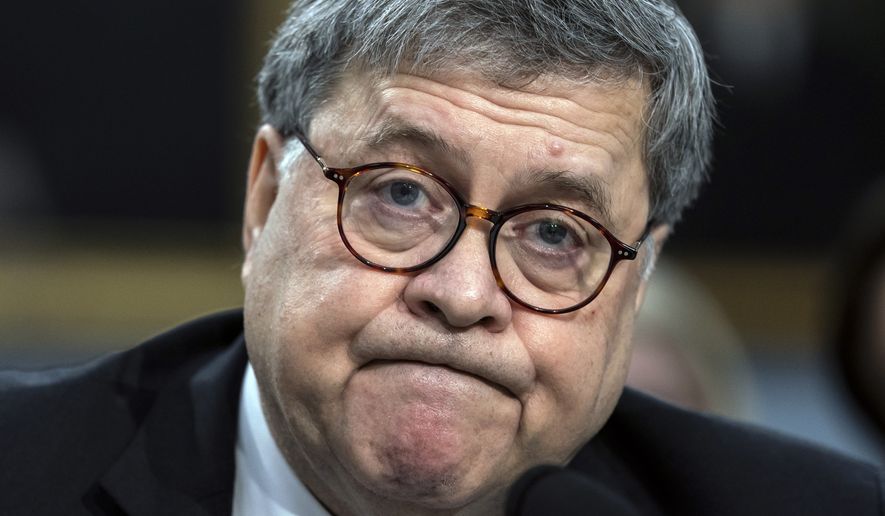A federal appeals court upheld the public release of a redacted 2019 Justice Department memo cited by Attorney General William P. Barr as the reason for not charging former President Donald Trump with obstructing the Russia collusion probe.
In a unanimous 28-page decision Friday, a three-judge panel on the U.S. Court of Appeals for the D.C. Circuit ruled that the Justice Department, which has spent two years fighting the memo’s release, improperly shielded portions of the memo from the public.
The memo has been long-sought by Mr. Barr’s critics who accuse him of distorting special counsel Robert Mueller’s findings to protect Mr. Trump from obstruction or shield himself from allegations he lied to Congress.
Citizens for Responsibility & Ethics in Washington, a left-leaning open-government organization, filed the lawsuit seeking the memo.
The panel ruled that the memo, which was written by the Justice Department’s Office of Legal Counsel, was not a legal analysis of whether Mr. Trump should be charged with a crime. Instead, the court ruled it detailed what Mr. Barr should say to Congress and the public about Mr. Mueller’s findings on whether the former president obstructed his investigation.
“Because the Department did not tie the memorandum to deliberations about the relevant decision, the Department failed to justify its reliance on the deliberative-process privilege,” Chief Judge Sri Srinivasan wrote for the panel.
Judge Srinivasan, who was appointed by former President Barack Obama, also wrote that the Justice Department never proved the memo should remain shielded from the public, accusing it of creating a “misimpression” about the nature of its decisional process on whether to charge Mr. Trump with obstructing the Russia probe.
He said the Justice Department was given “ample opportunity” to tie the deliberation process to Mr. Barr’s public messaging, but never did so.
“The Department was given a number of opportunities to justify its withholding of the March 2019 memorandum,” Judge Srinivasan wrote.
The appellate court ruling upholds a May 2021 decision by U.S. Judge Amy Berman Jackson in Washington.
At the time, the Justice Department vowed it would appeal Judge Jackson’s decision, which accused the government of being “disingenuous” about its reasons for keeping the memo private.
Portions of the memo have been released to the public, but the Justice Department has bristled over releasing the full text, arguing it fell under exceptions to the public records law for attorney-client privilege and government decision-making.
A group of Senate Democrats last year urged Attorney General Merrick Garland not to appeal Judge Jackson’s decision. They said in a letter that Mr. Barr‘s memo needed to be exposed quickly.
In a somewhat surprising move, Mr. Garland ignored the Democrats’ call to abandon the case and pressed forward with the appeal.
“To be clear, these misrepresentations preceded your confirmation as Attorney General, but the Department you now lead bears responsibility for redressing them,” the lawmakers wrote at that time.
Mr. Barr said in 2019 that his decision to clear Mr. Trump of obstruction came in consultation with the Office of Legal Counsel and other department lawyers.
As part of that process, the OLC prepared the memo at issue in Judge Jackson’s decision.
In her 2021 ruling, Judge Jackson said the memo disputes Mr. Barr’s claim that the decision to charge the president “was under his purview” because special counsel Robert Mueller did not reach a conclusion on whether the president obstructed the probe of alleged Trump-Russia collusion.
She also said it appeared that the Justice Department leadership had decided not to prosecute Mr. Trump even before Mr. Mueller submitted his final report.
“The review of the document reveals that the attorney general was not then engaged in making a decision about whether the president should be charged with obstruction of justice; the fact that he would not be prosecuted was a given,” she wrote.
In March 2019, Mr. Barr sent a four-page letter to Congress summarizing Mr. Mueller’s conclusions in his investigation into ties between the Trump campaign and Russians who meddled in the 2016 presidential election.
Mr. Barr wrote in the letter that after consulting with the OLC, he determined that the investigation did not support charging the president with obstruction.
Correction: The last name of Chief Judge Sri Srinivasan was misspelled on one reference in a previous version of this story.
• Jeff Mordock can be reached at jmordock@washingtontimes.com.




Please read our comment policy before commenting.